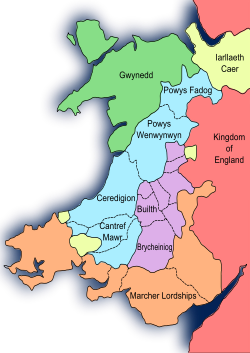
Treaty of Montgomery
Encyclopedia

Llywelyn the Last
Llywelyn ap Gruffydd or Llywelyn Ein Llyw Olaf , sometimes rendered as Llywelyn II, was the last prince of an independent Wales before its conquest by Edward I of England....
was acknowledged as Prince of Wales
Prince of Wales
Prince of Wales is a title traditionally granted to the heir apparent to the reigning monarch of the United Kingdom of Great Britain and Northern Ireland and the 15 other independent Commonwealth realms...
by the English
England
England is a country that is part of the United Kingdom. It shares land borders with Scotland to the north and Wales to the west; the Irish Sea is to the north west, the Celtic Sea to the south west, with the North Sea to the east and the English Channel to the south separating it from continental...
king Henry III
Henry III of England
Henry III was the son and successor of John as King of England, reigning for 56 years from 1216 until his death. His contemporaries knew him as Henry of Winchester. He was the first child king in England since the reign of Æthelred the Unready...
, the only time in history that an English ruler would recognise the right of a ruler of Gwynedd over Wales. Llywelyn's grandfather, Llywelyn the Great
Llywelyn the Great
Llywelyn the Great , full name Llywelyn ab Iorwerth, was a Prince of Gwynedd in north Wales and eventually de facto ruler over most of Wales...
, had previously laid claim to be the effective prince of Wales by using the title 'prince of Aberffraw, lord of Snowdon' in the 1230s, having subdued by force and diplomacy all the other Welsh dynasties, and Llywelyn's uncle, Dafydd ap Llywelyn
Dafydd ap Llywelyn
Dafydd ap Llywelyn was Prince of Gwynedd from 1240 to 1246. He was for a time recognised as Prince of Wales.- Descent :...
, is known to have claimed the title of prince of Wales during his reign (1240-46). However, Llywelyn's supremacy in the late 1260s forced recognition of his authority in Wales from an English Crown weakened by internal division.
Conditions of the treaty
Many of the conditions of the treaty had been anticipated by the Treaty of PiptonTreaty of Pipton
The Treaty of Pipton was signed on 22 June 1265 during the Second Barons' War and concluded an alliance between Simon de Montfort and the Welsh prince Llywelyn the Last....
(1265) between Llywelyn and Simon de Montfort
Simon de Montfort, 6th Earl of Leicester
Simon de Montfort, 6th Earl of Leicester, 1st Earl of Chester , sometimes referred to as Simon V de Montfort to distinguish him from other Simon de Montforts, was an Anglo-Norman nobleman. He led the barons' rebellion against King Henry III of England during the Second Barons' War of 1263-4, and...
. The 1267 treaty ceded Builth to Llywelyn, along with Brecon
Brecon
Brecon is a long-established market town and community in southern Powys, Mid Wales, with a population of 7,901. It was the county town of the historic county of Brecknockshire; although its role as such was eclipsed with the formation of Powys, it remains an important local centre...
and Gwerthrynion in mid-Wales. Llywelyn was also granted Whittington Castle
Whittington Castle
Whittington Castle is a castle in northern Shropshire, England, owned and managed by the Whittington Castle Preservation Fund. The castle was originally a motte-and-bailey castle, but this was replaced in the 13th century by one with buildings around a courtyard whose exterior wall was the curtain...
in modern-day Shropshire, previously held by his grandfather in the 1220s, and received an assurance that no castle would be built at Hawarden
Hawarden
Hawarden is a village in Flintshire, North Wales. Hawarden forms part of the Deeside conurbation on the Welsh/English border. At the 2001 Census, the population of Hawarden Ward was 1,858...
for sixty years by Robert of Mold, thus helping to secure the north-eastern border of Wales. The treaty also allowed for the reinstatement of Llywelyn's brother, Dafydd ap Gruffudd, into Welsh society after his defection to England in the early 1260s.
Implications
Though the treaty required Llywelyn to swear homage to the king of England, it was in effect an acknowledgement of the power and authority of the prince, effectively demonstrating his independence. However, after the succession of Edward I as king of England in 1272, relations between England and Wales deteriorated, and Edward declared war on Llywelyn in 1276; the Treaty of AberconwyTreaty of Aberconwy
The Treaty of Aberconwy was signed in 1277 by King Edward I of England and Llewelyn the Last of modern-day Wales, who had fought each other on and off for years over control of the Welsh countryside...
of 1277 superseded the stipulations laid down at Montgomery and severely curbed Llywelyn's power.

